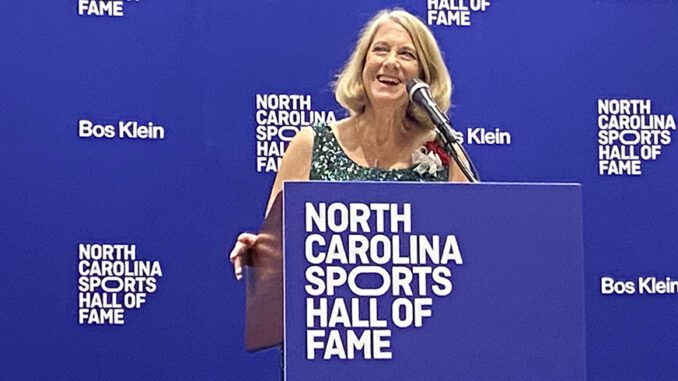
RALEIGH — Judy Rose has served as a role model and mentor to countless young women in sports administration since she was named athletic director at Charlotte in 1990.
It’s an advantage that wasn’t available to her when she was first getting started.
“I was just the third female in the country at a Division I program, and the other two were on the West Coast,” she said. “I didn’t know them. I’d had no interaction with them, and I remember saying to our chancellor at the time, ‘I don’t have any mentors.’”
That chancellor, Dr. Jim Woodward, was sympathetic to Rose’s situation and determined to help put her in the best position to succeed. So he introduced her to two of the most successful female business leaders in Charlotte and suggested he learn from them.
One was Dale Halton, president of the local Pepsi-Cola Bottling Company. The other was Pat Rodgers, the leader of a large construction company.
“(Dr. Woodward) told me that they don’t have to be in athletics to be a mentor,” Rose said. “He told me, ‘They are CEOs. You are the CEO of the athletic department.’”
That businesslike approach helped Rose become one of the nation’s most respected athletic directors, regardless of gender.
During her 28 years in charge of Charlotte’s program, she oversaw more than $100 million in facility expansion and renovations, added seven new sports — including a football program that made it to a bowl game in just six years — and hired coaches that combined to earn 44 NCAA Tournament appearances and win 70 conference titles at the time of her retirement in 2018.
It’s a list of accomplishments that earned her a place in the North Carolina Sports Hall of Fame. Rose was inducted as a member of the shrine’s Class of 2021 last month at a ceremony in Raleigh, along with fellow honorees Debbie Antonelli, Mack Brown, Dennis Craddock, Dr. Charles Kernodle, Mac Morris, Trot Nixon, Julius Peppers, Bobby Purcell, Tim Stevens and Donnell Woolford.
“Humbling,” she said of the recognition. “I feel blessed to have had the opportunities, and I’m proud of what we did at Charlotte while I was there.”
Rose’s contributions to college athletics reached far beyond the Queen City.
Her national reputation began to grow in 1994 when Charlotte served as host for the men’s basketball Final Four. Her work there caught the attention of fellow athletic directors and NCAA men’s basketball committee members C.M. Newton, DeLoss Dodds and Les Robinson.
Five years later, she became the first female member of the committee that selects and seeds the tournament bracket and manages all aspects of the event from the first round to the Final Four.
Although she admits that there were times in which she “felt like I was on an island” as the only woman in the room, she added that those instances were few and far between.
“That was the absolute best experience I’ve ever had,” she said. “They embraced me. They were wonderful. I’m still connected with those people.”
For all of her strengths and knowledge of NCAA governmental issues, Rose’s ability to cultivate and maintain relationships may be her greatest asset.
She said many of Charlotte’s most prominent athletic donors have become lifelong personal friends. She has also remained close with her former players, several of whom surprised her by attending her Hall of Fame induction ceremony.
Among those that couldn’t be there was Pat Summitt.
The Hall of Fame women’s basketball coach, who won 1,098 games and eight national championships at Tennessee, was one of Rose’s earliest influences in college sports. She, Rose and former North Carolina coach Sylvia Hatchell all served on the same staff with the Volunteers in 1975 before Rose left to become the first women’s coach at Charlotte.
As much as she enjoyed her 43 years with the 49ers, Rose said she has no regrets about stepping away when she did thanks to the changing landscape of college athletics — including issues such as name, image and likeness, transfers and a potential reorganization of the NCAA.
“There’s no better time to be a retired athletic director because what’s going on in our industry is unsettling to me,” she said. “It’s not what (she and her contemporaries) signed up for. I’m not saying that it can’t work, but it’s different and I’m not sure we would have adjusted.”
That doesn’t mean she’s stepped away from the game completely. She continues to serve as a mentor for younger women that have followed her into athletic administration.
“I was so fortunate in so many ways,” Rose said. “I believe in paying it forward.”



